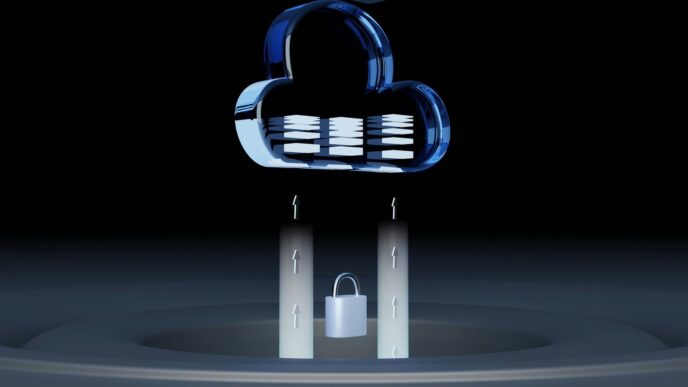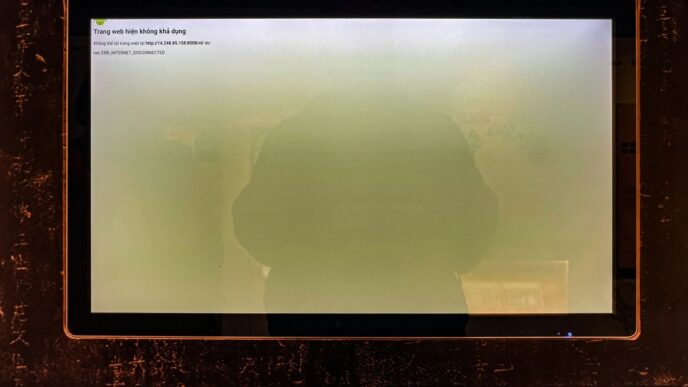VIP72 has been a significant player in the world of online anonymity for over 15 years. Initially launched as a way for users to mask their identities while browsing the internet, it quickly became a tool for cybercriminals looking to hide their activities. However, in recent times, VIP72 has faced a decline, raising questions about its legacy and the future of similar services. This article explores the rise and fall of VIP72, its impact on cybercrime, and what lies ahead for proxy networks.
Key Takeaways
- VIP72 was founded by a hacker known as Corpse, who previously created notorious malware.
- The service allowed users to anonymize their online activities by routing traffic through infected computers.
- VIP72 gained traction in cybercrime circles, becoming a go-to tool for various illegal activities.
- The network’s decline was marked by a sudden disappearance from the online space and increased law enforcement scrutiny.
- Despite its fall, VIP72’s influence continues to shape the landscape of proxy networks and cybercrime.
The Origins Of VIP72
Founding By Corpse
VIP72’s story starts with a shadowy figure known as "Corpse." This individual, a Russian-speaking hacker, had already made a name for himself in the cybercrime world. Corpse was infamous for creating and selling the A311 Death trojan, also known as Haxdoor and Nuclear Grabber. This banking trojan was incredibly advanced for its time and was used in several million-dollar cyber heists. The domain Vip72[.]org was registered to Corpse in 2006. It’s believed that VIP72 was launched using systems already compromised by Corpse’s malware.
Initial Offerings
VIP72 emerged as a proxy network, offering users a way to mask their IP addresses by routing their internet traffic through a network of compromised computers. This allowed them to appear as if they were browsing from a different location, providing a layer of anonymity. The service was advertised on underground forums, targeting individuals involved in various cybercriminal activities. It’s interesting to note that the service was initially advertised by someone using the handle "Revive," who is believed to be the same person as Corpse. The initial proxy network offerings were pretty basic, but they quickly gained traction due to their effectiveness and low cost.
Early Adoption In Cybercrime
VIP72 quickly found a niche among cybercriminals. Its ability to hide a user’s true location made it ideal for activities like:
- Fraud: Masking the origin of fraudulent transactions.
- Spamming: Sending spam emails without revealing the sender’s IP address.
- Hacking: Concealing the location of hackers during attacks.
- Data theft: Anonymizing the source of data breaches.
The service’s affordability and ease of use made it accessible to a wide range of cybercriminals, contributing to its rapid growth. It became a go-to tool for those looking to hide their online activity and avoid detection.
The Functionality Of VIP72
How Proxy Networks Operate
Okay, so proxy networks. The basic idea is pretty simple. Instead of connecting directly to a website, your internet traffic goes through another computer – the proxy server. This server then forwards your request to the website, and sends the website’s response back to you. This masks your IP address, making it look like the traffic is coming from the proxy server, not your actual computer. It’s like using a fake return address on a letter.
User Anonymity Features
VIP72, like other proxy services, offered several features aimed at boosting user anonymity. The main one was IP address masking, obviously. But it also let users pick proxy servers in different countries. This made it harder to trace online activity back to the user’s real location. It’s worth noting that while VIP72 aimed for anonymity, it wasn’t foolproof. Things like browser fingerprinting and tracking cookies could still potentially reveal a user’s identity. For a deeper understanding of free and paid VPN services, it’s important to consider the trade-offs between cost and security.
Traffic Routing Mechanism
VIP72’s traffic routing was a bit shady, to be honest. Unlike normal proxy services that use dedicated servers, VIP72 used computers infected with malware. When you used VIP72, your traffic was routed through these compromised machines. This meant that the owners of those computers had no idea their systems were being used as proxies. It also meant that the performance of the network was unpredictable, since it depended on the availability and speed of the infected machines. The whole thing was a house of cards built on malware proxy network.
The Rise Of VIP72 In Cybercrime
Market Penetration
VIP72’s rise in the cybercrime world was pretty quick. It became a go-to service for criminals needing to hide their tracks. The network’s structure, using compromised computers as proxies, made it tough to trace malicious activity back to the actual perpetrators. It was like a digital cloak, and criminals loved it. The price point was also attractive, making it accessible to a wide range of cybercriminals, from small-time fraudsters to more organized groups. This accessibility fueled its rapid spread and integration into various criminal operations. It wasn’t long before VIP72 was a household name, so to speak, in the dark corners of the internet. The cybersecurity measures at the time were not enough to stop it.
Notable Users
While it’s tough to pin down specific names, VIP72 was used in a bunch of high-profile cybercrimes. Think data breaches, financial fraud, and even espionage. The anonymity it provided allowed attackers to operate without fear of being identified. Law enforcement agencies around the world struggled to track down these individuals, as the proxy network made attribution incredibly difficult. It’s believed that various hacking groups and individuals involved in malware distribution, phishing campaigns, and other illicit activities relied on VIP72 to mask their locations and identities. The service became an integral part of their toolkit, enabling them to carry out their operations with a higher degree of impunity. The fact that VIP72 was linked to the A311 Death trojan only added to its notoriety.
Impact On Cybersecurity
VIP72 had a big impact on cybersecurity. It made it harder to investigate cybercrimes and catch the bad guys. The network’s size and global distribution meant that attacks could originate from anywhere, making it difficult to trace the source. This led to a cat-and-mouse game between law enforcement and cybercriminals, with each side constantly trying to outsmart the other. The rise of VIP72 also highlighted the need for better security measures and international cooperation to combat cybercrime. It forced the cybersecurity community to develop new techniques for tracking and disrupting proxy networks, as well as for identifying and prosecuting the individuals who used them. The proxy network was a real game changer.
The Decline Of VIP72
Disappearance Of Online Presence
So, what happened to VIP72? Well, around early September 2021, the VIP72 storefront simply vanished. Gone. Poof. It’s like they just packed up shop and left without a trace. For a service that had been running for about 15 years, that’s pretty abrupt. The website, which had been at the same U.S.-based address for over a decade, just disappeared. No warning, no explanation. One day it was there, the next, it wasn’t. It definitely raised some eyebrows in the cybersecurity world.
Law Enforcement Actions
While there’s no official confirmation, the sudden disappearance of VIP72 strongly suggests some kind of law enforcement intervention. When a service like this goes dark so suddenly, it’s often because authorities have stepped in. It’s possible that investigations into the network’s activities led to a shutdown, or maybe the operators decided to pull the plug before things got worse. Either way, it’s hard to imagine a legitimate reason for such an abrupt exit. It’s all speculation, of course, but it’s the most likely explanation.
Community Reactions
The reaction in the cybercrime community was, predictably, a mix of concern and speculation. Some users worried about getting caught using the service, while others wondered where they’d get their proxies now. There was a lot of chatter on forums about alternative services and whether VIP72 would ever return. Some people were convinced it was a temporary blip, while others believed it was the end of an era. The uncertainty created a lot of anxiety among those who relied on VIP72 for their activities.
Here’s a quick rundown of the reactions:
- Worry about exposure.
- Search for alternatives.
- Speculation about the future of VIP72.
- General unease and distrust.
Legacy Of VIP72
Influence On Future Proxy Networks
VIP72, despite its shady origins, inadvertently shaped the landscape of proxy networks. Its extensive reach and relatively low cost made it a popular choice among cybercriminals, demonstrating the demand for such services. This, in turn, influenced the development of other proxy networks, some of which attempted to address the security and ethical concerns that plagued VIP72. You see more networks now, but they all kinda owe something to VIP72, even if they don’t want to admit it.
Lessons Learned
The VIP72 saga offers several important lessons for cybersecurity professionals and law enforcement agencies. These include:
- The importance of monitoring and disrupting malicious proxy networks.
- The need for international cooperation to combat cybercrime.
- The potential for malware to be used for unintended purposes, like creating proxy networks.
- The fact that even services built on criminal activity can last a surprisingly long time. It’s a reminder that we can’t just ignore these things and hope they go away. We need to be proactive.
Continued Relevance In Cybercrime
Even after its disappearance, VIP72’s impact on cybercrime remains. The techniques it popularized, such as using malware-infected computers as proxies, are still in use today. Plus, the data it generated – IP addresses, user activity, etc. – could still be floating around, potentially compromising hacked inboxes or being used in new attacks. It serves as a reminder that the digital world never really forgets, and the ghosts of VIP72 might haunt us for years to come.
Comparative Analysis With Other Networks
VIP72 Versus Other Proxy Services
Okay, so VIP72 wasn’t the only proxy network out there, not by a long shot. You had your big players like Luminati (now Bright Data), Smartproxy, and Oxylabs. These guys are more corporate, offering a wider range of services and, honestly, a more polished experience. VIP72 was always a bit rough around the edges, which, depending on what you were using it for, could be a plus or a minus. Think of it like this: Bright Data is like a fancy Swiss Army knife, while VIP72 was more like a rusty but reliable multi-tool you found in your grandpa’s garage. Both get the job done, but in very different ways. For example, Mysterium VPN is a blockchain-based VPN that focuses on secure and anonymous internet connections.
Unique Selling Points
What made VIP72 stand out? Well, a few things. First, it was cheap. Like, really cheap. That made it attractive to people who didn’t want to shell out big bucks for a proxy service. Second, it had a huge pool of residential IPs, which made it harder to detect than datacenter proxies. But the biggest thing was probably its association with the criminal underground. It was known as a go-to for certain activities, which, while not exactly a selling point for legitimate users, definitely gave it a certain notoriety. It’s like the difference between buying a car from a reputable dealer versus buying one from a guy in a back alley – you know what you’re getting into.
Market Positioning
VIP72 carved out a specific niche for itself. It wasn’t trying to compete with the big boys on features or customer service. Instead, it focused on affordability and anonymity, catering to a user base that often operated in the shadows. This positioning ultimately led to its downfall, as law enforcement agencies started cracking down on its illicit uses. It’s a classic case of "live by the sword, die by the sword." While other proxy services focused on businesses needing residential IPs, VIP72 was more about individuals needing to hide their tracks. It’s a pretty big difference, and it shaped everything about how the network operated.
The Future Of Proxy Networks
Emerging Trends
The world of proxy networks is changing fast. It’s not just about hiding your IP anymore; it’s about adapting to new technologies and threats. One big trend is the rise of AI-powered proxy management. These systems can automatically switch between proxies to maintain optimal speed and anonymity, something that’s becoming crucial as websites get better at detecting and blocking proxies. Another trend is the increasing use of mobile proxies, which use real mobile devices as exit nodes, making them harder to detect than traditional datacenter proxies. Finally, we’re seeing more specialized proxy services that cater to specific needs, like sneaker copping or social media automation.
Technological Advancements
Technology is always pushing the boundaries of what proxy networks can do. Here are some advancements:
- Improved Encryption: Better encryption protocols are making proxy connections more secure and harder to intercept.
- Decentralized Networks: Blockchain-based proxy networks are emerging, offering greater transparency and resistance to censorship. Imagine a decentralized VPN that’s nearly impossible to shut down.
- Faster Speeds: New proxy protocols and optimized routing algorithms are boosting connection speeds, making proxies more viable for bandwidth-intensive tasks.
Regulatory Challenges
As proxy networks become more sophisticated, regulators are struggling to keep up. It’s a constant cat-and-mouse game. One challenge is defining the legality of proxy services. Are they tools for legitimate privacy, or enablers of cybercrime? Different countries have different answers. Another challenge is enforcing regulations across borders. Many proxy networks operate in jurisdictions with lax laws, making it difficult to hold them accountable. Finally, there’s the issue of balancing privacy with security. Governments want to be able to track down criminals who use proxies, but they also need to protect the privacy of ordinary citizens. It’s a tough balancing act. The growth of the residential proxy IP network market is a testament to this challenge.
The End of an Era for VIP72
So, there you have it. VIP72, once a go-to for those looking to hide their online tracks, has seemingly shut its doors after 15 years. It’s wild to think about how a service like this could thrive for so long, built on the backs of compromised computers. But in the end, nothing lasts forever, especially in the world of cybercrime. With law enforcement tightening the noose and more awareness around online security, it’s no surprise that VIP72 has gone dark. It’s a reminder that the internet can be a dangerous place, and those who think they can operate in the shadows might just find themselves in the spotlight. What comes next for those who relied on VIP72? Only time will tell.
Frequently Asked Questions
What is VIP72?
VIP72 is a proxy service that allows users to hide their real location online by routing their internet traffic through other computers.
Who started VIP72?
VIP72 was created by a hacker known as ‘Corpse’ in 2006.
Why do people use VIP72?
Many people use VIP72 to remain anonymous online, especially those involved in cybercrime.
What happened to VIP72?
VIP72’s website disappeared a few weeks ago, leaving many users confused.
How does VIP72 work?
VIP72 works by sending your internet traffic through infected computers, which makes it hard to trace back to you.
Is VIP72 still active?
As of now, VIP72 seems to be inactive, but its impact on cybercrime is still felt.














